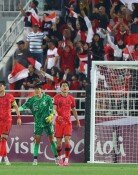Dokdo dispute strategy shifts from strong to low profile
Dokdo dispute strategy shifts from strong to low profile
Posted April. 01, 2011 10:02,
The Korean government had announced a tough stance on the disputed Dokdo islets since Friday last week before Japans review of middle school textbooks claiming Japanese territorial rights to Dokdo.
When Tokyo announced the results of a study that upheld its claim Wednesday, Seoul shifted its position to a quiet response.
Experts say Korea intends to soothe public sentiment among Koreans over the row while not allowing Japan to make the dispute grow into an international conflict.
They say Seoul has no choice but to respond to Japans territorial claim in a situation that requires Korea to please the public and protect national interests.
As Korea effectively occupies Dokdo, all it has to do is to maintain the status of peaceful exercise of its sovereignty over Dokdo without having to take further action, said Kim Chan-gyu, professor emeritus at Kyung Hee University in Seoul, adding, If the Korean government overreacts and gives Japan an excuse to counter, the peaceful state will be broken and this will only benefit Japan.
Under the low-profile strategy, Seoul started a project to repair a heliport on Dokdo in mid-March with a goal to complete it by May but did not publicize this action.
Seoul has used the heliport for 30 years since its completion in 1981. Calls for its renovation grew after a recent safety check.
Japan might be aware of the renovation project but can raise issue over it if Korea gives direct and official publicity for it, a Korean government official said.
Another official said Seoul has been implementing most of the 28 projects to develop Dokdo except for a project worth 500 billion won (456 million U.S. dollars) to build seawalls on the islets.
The problem is, however, that Seouls low-profile approach will trigger a strong public response against Tokyo at a time when Japan is escalating its history distortion in school textbooks and government documents.
While the construction of seawalls on Dokdo hurts Koreas national interests because of the islets geographical condition, environmental and economic issues, and Japans possible provocation due to a territorial dispute, we have no choice but to build them if the people want it because of Japans continued provocations, a Korean diplomatic official said.
Seoul`s decision to sporadically offer goods to Tokyo rather than providing a large amount of money to help earthquake relief efforts seemed to reflect such public sentiment. Koreas private sector has collected more than 60 billion won (54.7 million dollars) in donations, but Seoul has sent just 100 tons of bottled water, 6,000 blankets, emergency food aid, rubber gloves and instant steamed rice.
The Korean Foreign Affairs and Trade Ministry in a meeting Wednesday discussed Seouls response to Tokyos announcement of a diplomatic blue paper scheduled for April.
The fundamental cause of the Dokdo issue is the process of Japans colonial invasion in the early 20th century, a ministry spokesman said. Japan must make a rigorous self-reflection.
kyle@donga.com







